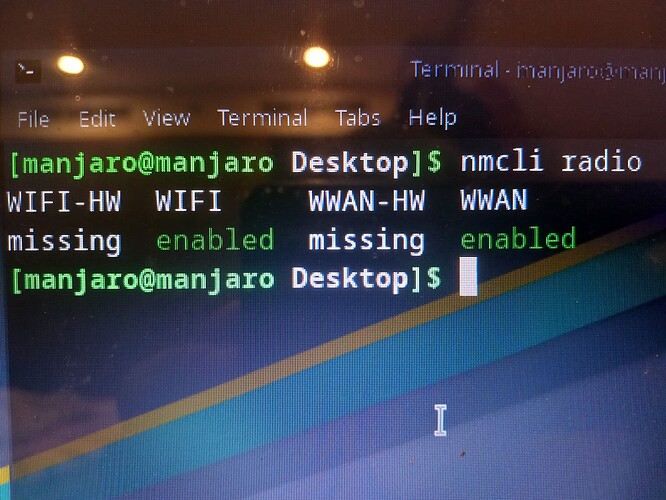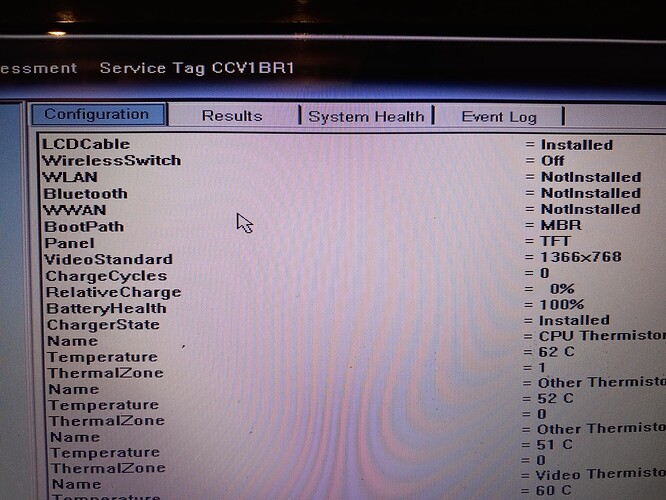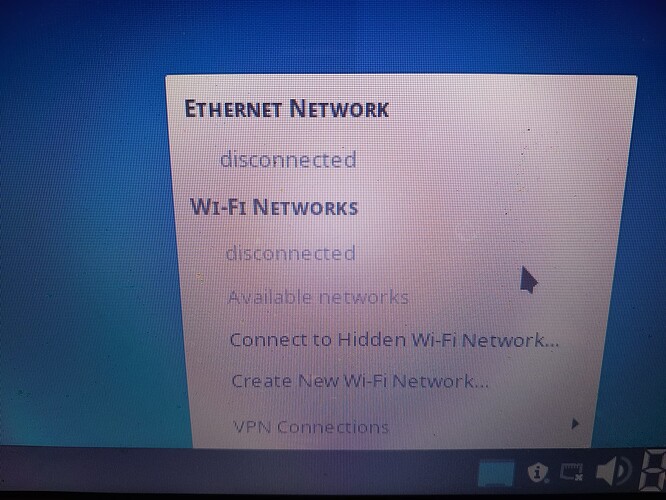I updated my machine manjaro x force and wifi card isnot configured any more …so how to downgrade ?or what is the solution?
Is this meant to be XFCE ?
We dont have any information.
Downgrade is a last resort, and we wouldnt even know what to downgrade.
Instead maybe we can start with:
[HowTo] Provide System Information
Ok i will share system information
CPU:
Info: model: Intel Core i5-2430M bits: 64 type: MT MCP arch: Sandy Bridge
gen: core 2 level: v2 built: 2010-12 process: Intel 32nm family: 6
model-id: 0x2A (42) stepping: 7 microcode: 0x2F
Topology: cpus: 1x cores: 2 tpc: 2 threads: 4 smt: enabled cache:
L1: 128 KiB desc: d-2x32 KiB; i-2x32 KiB L2: 512 KiB desc: 2x256 KiB
L3: 3 MiB desc: 1x3 MiB
Speed (MHz): avg: 798 min/max: 800/3000 scaling: driver: intel_cpufreq
governor: schedutil cores: 1: 798 2: 798 3: 798 4: 798 bogomips: 19167
Flags: acpi aes aperfmperf apic arat arch_perfmon avx bts clflush cmov
constant_tsc cpuid cx16 cx8 de ds_cpl dtes64 dtherm dts epb ept est
flexpriority flush_l1d fpu fxsr ht ibpb ibrs ida lahf_lm lm mca mce
md_clear mmx monitor msr mtrr nonstop_tsc nopl nx pae pat pbe pcid
pclmulqdq pdcm pebs pge pln pni popcnt pse pse36 pti pts rdtscp rep_good
sep ssbd sse sse2 sse4_1 sse4_2 ssse3 stibp syscall tm tm2 tpr_shadow tsc
tsc_deadline_timer vme vmx vnmi vpid x2apic xsave xsaveopt xtopology xtpr
Vulnerabilities:
Type: gather_data_sampling status: Not affected
Type: itlb_multihit status: KVM: VMX disabled
Type: l1tf mitigation: PTE Inversion; VMX: conditional cache flushes, SMT
vulnerable
Type: mds mitigation: Clear CPU buffers; SMT vulnerable
Type: meltdown mitigation: PTI
Type: mmio_stale_data status: Unknown: No mitigations
Type: retbleed status: Not affected
Type: spec_rstack_overflow status: Not affected
Type: spec_store_bypass mitigation: Speculative Store Bypass disabled via
prctl and seccomp
Type: spectre_v1 mitigation: usercopy/swapgs barriers and __user pointer
sanitization
Type: spectre_v2 mitigation: Retpolines, IBPB: conditional, IBRS_FW,
STIBP: conditional, RSB filling, PBRSB-eIBRS: Not affected
Type: srbds status: Not affected
Type: tsx_async_abort status: Not affected
Network:
Device-1: Realtek RTL810xE PCI Express Fast Ethernet vendor: Dell
driver: r8169 v: kernel pcie: gen: 1 speed: 2.5 GT/s lanes: 1 port: d000
bus-ID: 05:00.0 chip-ID: 10ec:8136 class-ID: 0200
It is preferable you show the entire output of inxi -Fazy and not just what you think is relevant.
For example … I dont know what kernel you are running.
System:
Kernel: 5.10.189-1-MANJARO arch: x86_64 bits: 64 compiler: gcc v: 13.2.1
clocksource: tsc available: hpet,acpi_pm
parameters: BOOT_IMAGE=/boot/vmlinuz-5.10-x86_64
root=UUID=e0ec0b47-6af7-486a-9cc3-5456a7489838 rw quiet apparmor=1
security=apparmor udev.log_priority=3
Desktop: Xfce v: 4.18.1 tk: Gtk v: 3.24.36 info: xfce4-panel wm: xfwm
v: 4.18.0 vt: 7 dm: LightDM v: 1.32.0 Distro: Manjaro Linux base: Arch Linux
Machine:
Type: Portable System: Dell product: Inspiron N5110 v: N/A
serial: <superuser required> Chassis: type: 8 serial: <superuser required>
Mobo: Dell model: 0FXK2Y v: A07 serial: <superuser required> BIOS: Dell
v: A07 date: 07/18/2011
Battery:
ID-1: BAT0 charge: 0% condition: 45.6/48.6 Wh (93.9%) volts: 0.3 min: 10.8
model: Sanyo DELL 4YRJH19 type: Li-ion serial: <filter> status: N/A
CPU:
Info: model: Intel Core i5-2430M bits: 64 type: MT MCP arch: Sandy Bridge
gen: core 2 level: v2 built: 2010-12 process: Intel 32nm family: 6
model-id: 0x2A (42) stepping: 7 microcode: 0x2F
Topology: cpus: 1x cores: 2 tpc: 2 threads: 4 smt: enabled cache:
L1: 128 KiB desc: d-2x32 KiB; i-2x32 KiB L2: 512 KiB desc: 2x256 KiB
L3: 3 MiB desc: 1x3 MiB
Speed (MHz): avg: 797 high: 798 min/max: 800/3000 scaling:
driver: intel_cpufreq governor: schedutil cores: 1: 798 2: 798 3: 797 4: 798
bogomips: 19167
Flags: avx ht lm nx pae sse sse2 sse3 sse4_1 sse4_2 ssse3 vmx
Vulnerabilities:
Type: gather_data_sampling status: Not affected
Type: itlb_multihit status: KVM: VMX disabled
Type: l1tf mitigation: PTE Inversion; VMX: conditional cache flushes, SMT
vulnerable
Type: mds mitigation: Clear CPU buffers; SMT vulnerable
Type: meltdown mitigation: PTI
Type: mmio_stale_data status: Unknown: No mitigations
Type: retbleed status: Not affected
Type: spec_rstack_overflow status: Not affected
Type: spec_store_bypass mitigation: Speculative Store Bypass disabled via
prctl and seccomp
Type: spectre_v1 mitigation: usercopy/swapgs barriers and __user pointer
sanitization
Type: spectre_v2 mitigation: Retpolines, IBPB: conditional, IBRS_FW,
STIBP: conditional, RSB filling, PBRSB-eIBRS: Not affected
Type: srbds status: Not affected
Type: tsx_async_abort status: Not affected
Graphics:
Device-1: Intel 2nd Generation Core Processor Family Integrated Graphics
vendor: Dell driver: i915 v: kernel arch: Gen-6 code: Sandybridge
process: Intel 32nm built: 2011 ports: active: LVDS-1 empty: VGA-1
bus-ID: 00:02.0 chip-ID: 8086:0116 class-ID: 0300
Device-2: NVIDIA GF108M [GeForce GT 525M] vendor: Dell driver: N/A
alternate: nouveau, nvidia_drm, nvidia non-free: series: 390.xx+
status: legacy-active (EOL~late 2022) arch: Fermi code: GF1xx
process: 40/28nm built: 2010-16 pcie: speed: Unknown lanes: 63 link-max:
gen: 5 speed: 32 GT/s bus-ID: 01:00.0 chip-ID: 10de:0df5 class-ID: 0300
Device-3: Microdia Laptop_Integrated_Webcam_HD driver: uvcvideo type: USB
rev: 2.0 speed: 480 Mb/s lanes: 1 mode: 2.0 bus-ID: 1-1.5:4
chip-ID: 0c45:6485 class-ID: 0e02
Display: x11 server: X.Org v: 21.1.8 compositor: xfwm v: 4.18.0 driver: X:
loaded: intel dri: i965 gpu: i915 display-ID: :0.0 screens: 1
Screen-1: 0 s-res: 1366x768 s-dpi: 96 s-size: 361x203mm (14.21x7.99")
s-diag: 414mm (16.31")
Monitor-1: LVDS-1 mapped: LVDS1 model: AU Optronics 0x22ec built: 2009
res: 1366x768 hz: 60 dpi: 102 gamma: 1.2 size: 340x190mm (13.39x7.48")
diag: 394mm (15.5") ratio: 16:9 modes: 1366x768
API: OpenGL Message: Unable to show GL data. Required tool glxinfo missing.
^[[A^[[A^[[AAudio:
Device-1: Intel 6 Series/C200 Series Family High Definition Audio
vendor: Dell 6 driver: snd_hda_intel v: kernel bus-ID: 00:1b.0
chip-ID: 8086:1c20 class-ID: 0403
Device-2: NVIDIA GF108 High Definition Audio driver: snd_hda_intel
v: kernel pcie: speed: Unknown lanes: 63 link-max: gen: 5 speed: 32 GT/s
bus-ID: 01:00.1 chip-ID: 10de:0bea class-ID: 0403
API: ALSA v: k5.10.189-1-MANJARO status: kernel-api with: aoss
type: oss-emulator tools: alsactl,alsamixer,amixer
Server-1: JACK v: 0.125.0 status: off tools: N/A
Server-2: PipeWire v: 0.3.77 status: off tools: pw-cli
Server-3: PulseAudio v: 16.1 status: active with: 1: pulseaudio-alsa
type: plugin 2: pulseaudio-jack type: module tools: pacat,pactl
Network:
Device-1: Realtek RTL810xE PCI Express Fast Ethernet vendor: Dell
driver: r8169 v: kernel pcie: gen: 1 speed: 2.5 GT/s lanes: 1 port: d000
bus-ID: 05:00.0 chip-ID: 10ec:8136 class-ID: 0200
IF: enp5s0 state: down mac: <filter>
IF-ID-1: enp0s26u1u1 state: unknown speed: N/A duplex: N/A mac: <filter>
^[[A^[[A^[[A^[[ABluetooth:
Device-1: Samsung Galaxy series misc. (tethering mode) driver: rndis_host
v: kernel type: USB rev: 2.0 speed: 480 Mb/s lanes: 1 mode: 2.0
bus-ID: 1-1.1:8 chip-ID: 04e8:6863 class-ID: 0a00 serial: <filter>
Report: rfkill ID: hci0 rfk-id: 0 state: down bt-service: disabled
rfk-block: hardware: no software: no address: see --recommends
Device-2: Qualcomm Atheros AR3011 Bluetooth driver: btusb v: 0.8 type: USB
rev: 1.1 speed: 12 Mb/s lanes: 1 mode: 1.1 bus-ID: 1-1.4:3 chip-ID: 0cf3:3005
class-ID: e001
Report: This feature requires one of these tools: hciconfig/bt-adapter
Drives:
Local Storage: total: 698.64 GiB used: 25.73 GiB (3.7%)
SMART Message: Required tool smartctl not installed. Check --recommends
ID-1: /dev/sda maj-min: 8:0 vendor: Western Digital
model: WD7500BPVT-75HXZT3 size: 698.64 GiB block-size: physical: 4096 B
logical: 512 B speed: 3.0 Gb/s tech: HDD rpm: 5400 serial: <filter>
fw-rev: 1A03 scheme: MBR
Partition:
ID-1: / raw-size: 100 GiB size: 97.87 GiB (97.87%) used: 25.73 GiB (26.3%)
fs: ext4 dev: /dev/sda3 maj-min: 8:3
Swap:
Kernel: swappiness: 60 (default) cache-pressure: 100 (default) zswap: yes
compressor: zstd max-pool: 25%
ID-1: swap-1 type: file size: 8 GiB used: 2.81 GiB (35.2%) priority: -2
file: /swapfile
Sensors:
System Temperatures: cpu: 55.0 C mobo: N/A
Fan Speeds (rpm): cpu: 0
Info:
Processes: 217 Uptime: 1h 4m wakeups: 1 Memory: total: 4 GiB
available: 3.75 GiB used: 2.55 GiB (68.0%) Init: systemd v: 253
default: graphical tool: systemctl Compilers: gcc: 13.2.1 clang: 15.0.7
Packages: pm: pacman pkgs: 1194 libs: 348 tools: pamac pm: flatpak pkgs: 0
Shell: Bash v: 5.1.16 running-in: xfce4-terminal inxi: 3.3.29
So I guess thats the one not working.
But theres not much information.
lspci -k | grep -i net
05:00.0 Ethernet controller: Realtek Semiconductor Co., Ltd. RTL810xE PCI Express Fast Ethernet controller (rev 05)
Subsystem: Dell RTL810xE PCI Express Fast Ethernet controller
● NetworkManager.service - Network Manager
Loaded: loaded (/usr/lib/systemd/system/NetworkManager.service; enabled; preset: disabled)
Active: active (running) since Sun 2023-08-20 03:12:18 +03; 20min ago
Docs: man:NetworkManager(8)
Main PID: 857 (NetworkManager)
Tasks: 5 (limit: 4574)
Memory: 10.3M
CPU: 696ms
CGroup: /system.slice/NetworkManager.service
└─857 /usr/bin/NetworkManager --no-daemon
أغس 20 03:18:52 GK NetworkManager[857]: <info> [1692490732.0421] device (enp0s26u1u1): state change: config -> ip-config (reason 'non>
أغس 20 03:18:52 GK NetworkManager[857]: <info> [1692490732.0439] dhcp4 (enp0s26u1u1): activation: beginning transaction (timeout in 4>
أغس 20 03:18:52 GK NetworkManager[857]: <info> [1692490732.0885] dhcp4 (enp0s26u1u1): state changed new lease, address=192.168.141.248
أغس 20 03:18:52 GK NetworkManager[857]: <info> [1692490732.0930] policy: set 'Wired connection 2' (enp0s26u1u1) as default for IPv4 r>
أغس 20 03:18:52 GK NetworkManager[857]: <info> [1692490732.4046] device (enp0s26u1u1): state change: ip-config -> ip-check (reason 'n>
أغس 20 03:18:52 GK NetworkManager[857]: <info> [1692490732.4933] device (enp0s26u1u1): state change: ip-check -> secondaries (reason >
أغس 20 03:18:52 GK NetworkManager[857]: <info> [1692490732.4943] device (enp0s26u1u1): state change: secondaries -> activated (reason>
أغس 20 03:18:52 GK NetworkManager[857]: <info> [1692490732.4957] manager: NetworkManager state is now CONNECTED_SITE
أغس 20 03:18:52 GK NetworkManager[857]: <info> [1692490732.4971] device (enp0s26u1u1): Activation: successful, device activated.
أغس 20 03:18:52 GK NetworkManager[857]: <info> [1692490732.9457] manager: NetworkManager state is now CONNECTED_GLOBAL
if you have any commands to get more information .Please tell me
sudo hwinfo --network
33: None 00.0: 10701 Ethernet
[Created at net.126]
Unique ID: uhYi.ndpeucax6V1
Parent ID: D2Iq.IZkkL4x6sw6
SysFS ID: /class/net/enp5s0
SysFS Device Link: /devices/pci0000:00/0000:00:1c.1/0000:05:00.0
Hardware Class: network interface
Model: "Ethernet network interface"
Driver: "r8169"
Driver Modules: "r8169"
Device File: enp5s0
HW Address: 18:03:73:8e:b9:3b
Permanent HW Address: 18:03:73:8e:b9:3b
Link detected: no
Config Status: cfg=new, avail=yes, need=no, active=unknown
Attached to: #14 (Ethernet controller)
34: None 00.0: 10700 Loopback
[Created at net.126]
Unique ID: ZsBS.GQNx7L4uPNA
SysFS ID: /class/net/lo
Hardware Class: network interface
Model: "Loopback network interface"
Device File: lo
Link detected: yes
Config Status: cfg=new, avail=yes, need=no, active=unknown
35: None 00.0: 10701 Ethernet
[Created at net.126]
Unique ID: VsKK.ndpeucax6V1
Parent ID: lfzD.1jD1fiEEFk3
SysFS ID: /class/net/enp0s26u1u1
SysFS Device Link: /devices/pci0000:00/0000:00:1a.0/usb1/1-1/1-1.1/1-1.1:1.0
Hardware Class: network interface
Model: "Ethernet network interface"
Driver: "rndis_host"
Driver Modules: "rndis_host"
Device File: enp0s26u1u1
HW Address: 06:d0:c4:93:73:58
Link detected: yes
Config Status: cfg=new, avail=yes, need=no, active=unknown
Attached to: #24 (Ethernet controller)
Any other commands?
So: what got updated?
A new kernel?
Try installing a newer one - or simply a different one from those that are available
and then use this.
The wifi driver should be part of the kernel.
From the outputs you provided:
your system does not even see the presence of any wifi hardware.
it’s simply not there
The card might be switched off (some laptops have a hardware switch)
or it might have come lose and lost connection, or it might simply be broken.
Easiest is probably to boot the same live system you used to install from and see whether it still works there like it has been.
If that real tech wifi was using a dkms driver try:
sudo dkms autoinstall
then reboot.
If it wasn’t it will just show an error. I had a problem with my dkms package at the last stable update and I noticed a fair amount of similar realtech wifi issues afterwards. Worth a try.
Actually from two it worked then again the issue happened…there is no issue in Hardware
I update every thing sudo pacman -Syu
I don’t comprehend what that means. ![]()
Good that you know that - yet your outputs do not even show the mere presence of any wifi hardware.
I didn’t see any anyway …
lsusb
might show it - the device may be on the USB bus
but that should have shown up in the inxi output above
When looking at the machine type - we are looking at a firmware dated July 18. 2011 and a CPU built 2010-12 - being that old it is safe to assume that drivers are present with Linux
It appears your system has a Atheros AR3011 Bluetooth
WiFi and Bluetooth usually comes on the same card although that may not be true in this case.
From the info on rfkill it appears your device is powered down by hardware switch.
I suggest you look at the top keyboard row and locate the key for the wifi toggle - it may also be a separate key or touch area above the keyboard.
Don’t ask me which one - or where - I have no idea - but since you claim it worked - I believe you have - by accident - hit the hotkey combination disabling your wifi.
Bus 002 Device 003: ID 0bda:0138 Realtek Semiconductor Corp. RTS5138 Card Reader Controller
Bus 002 Device 002: ID 8087:0024 Intel Corp. Integrated Rate Matching Hub
Bus 002 Device 001: ID 1d6b:0002 Linux Foundation 2.0 root hub
Bus 004 Device 001: ID 1d6b:0003 Linux Foundation 3.0 root hub
Bus 003 Device 001: ID 1d6b:0002 Linux Foundation 2.0 root hub
Bus 001 Device 004: ID 0c45:6485 Microdia Laptop_Integrated_Webcam_HD
Bus 001 Device 005: ID 0cf3:3005 Qualcomm Atheros Communications AR3011 Bluetooth
Bus 001 Device 007: ID 04e8:6863 Samsung Electronics Co., Ltd Galaxy series, misc. (tethering mode)
Bus 001 Device 002: ID 8087:0024 Intel Corp. Integrated Rate Matching Hub
Bus 001 Device 001: ID 1d6b:0002 Linux Foundation 2.0 root hub
before it was happened then I just press Fn+F2 and usually worked but now nothing is happening , I will try to upgrade Kernal
Sorry, the realtec component was the ethernet adapter, I missed that.
I found a hw probe of a matching inspirion 5110 that shows an intel centrino-n wifi adapter: HW probe of Dell Inspiron N5110 #3f21759342 (the Qualcomm atheros might be a usb device)
If that’s correct this might be a problem with the intel centrino iwlwifi driver.
There’s a Bios setting to enable/disable wifi, please check it’s on. (Sometimes a weak cmos battery can cause weird changes of values)


